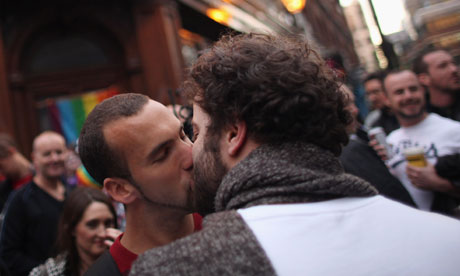
A group of influential doctors, men's health charities and senior politicians is calling for the vaccination of gay men against a cancer-causing sexually transmitted virus from which the NHS already protects young heterosexuals.
The British Association of Sexual Health and HIV, backed by the British Medical Association, the Terrence Higgins Trust and several MPs, wants government health advisers meeting this week to recommend extending a vaccination scheme currently restricted to adolescent girls.
Unless sexually active gay men are included in the programme to halt the spread of human papillomavirus (HPV), which is linked to genital warts and cervical, anal and other types of cancer, the group warns that deaths from preventable diseases could dramatically increase.
"We recognise that there's a burden of disease, particularly for gay men, that is not being met and we recognise that there's an effective intervention," said Dr David Asboe of BASHH.
Experts say the vaccination of 12- and 13-year-old girls against HPV has proved a potent weapon in reducing infections since it was introduced in 2008. As a consequence, heterosexual boys are also being indirectly protected, a concept known as "herd immunity".
This leaves sexually active gay men as the only group still at high risk. And with incidences of anal and other cancers on the rise as a consequence, many doctors say they are so concerned they would urge gay male relatives to pay for the treatment now. "Those of us in the know all went and bought the vaccine for their sons," said Dr Colm O'Mahony, chairman of the British Medical Association's venereology subcommittee. "I'm convinced from the evidence we've seen that it is extremely effective."
According to Asboe, studies show that vaccinating sexually active gay men up to the age of 26 can significantly reduce anal cancer, a disease for which no screening is available at present. Limiting the spread of genital warts also helps reduce HIV transmission.
BASHH wants the vaccine provided free to gay men attending sexual health clinics. Campaigners say the extra financial burden on the NHS will probably be offset in future years by a decline in calls for cancer treatments.
"With any healthcare intervention there's going to be arguments about the cost effectiveness," said Asboe. "A full analysis has not yet been conducted but certainly, in terms of cervical cancer, those arguments are well-rehearsed and it's a very cost-effective intervention."
The plan, which mirrors an existing programme offering hepatitis B vaccinations to gay men, has won the support of politicians on both sides of the Commons. Conservative MP Peter Bottomley compared it to campaigns that have all but eradicated smallpox and polio in the UK.
"In time my descendants won't be exposed to genital warts or cervical cancer because of the vaccination programme — except for those who might be men who have sex with men," he said.
"I don't see why gay men should be left out. If you want to reduce the antisocial transmission of viruses and if we want to reduce anal cancers the same way we reduce cervical cancers, we need to be open about where the gaps are."
Guy Slade of the Terrence Higgins Trust, a charity which campaigns on sexual health issues, said the shortfall in HPV protection amounted to discrimination.
"Gay men already experience poor sexual health as a group and if action is not taken we're going to see an ever widening healthy inequality emerge around HPV, anal cancer and warts," he said, "I don't think there is another area of health policy where men are so clearly losing out."
While it is hoped the government's joint committee on vaccination and immunisation will look favourably on the British Association of Sexual Health and HIV's request to extend the programme when it meets on June 13, Absoe said that a failure to do so could raise legal questions.
"Certainly any health intervention has to go through an equality impact assessment," he said. "And if our request isn't taken up then that needs to be addressed."

